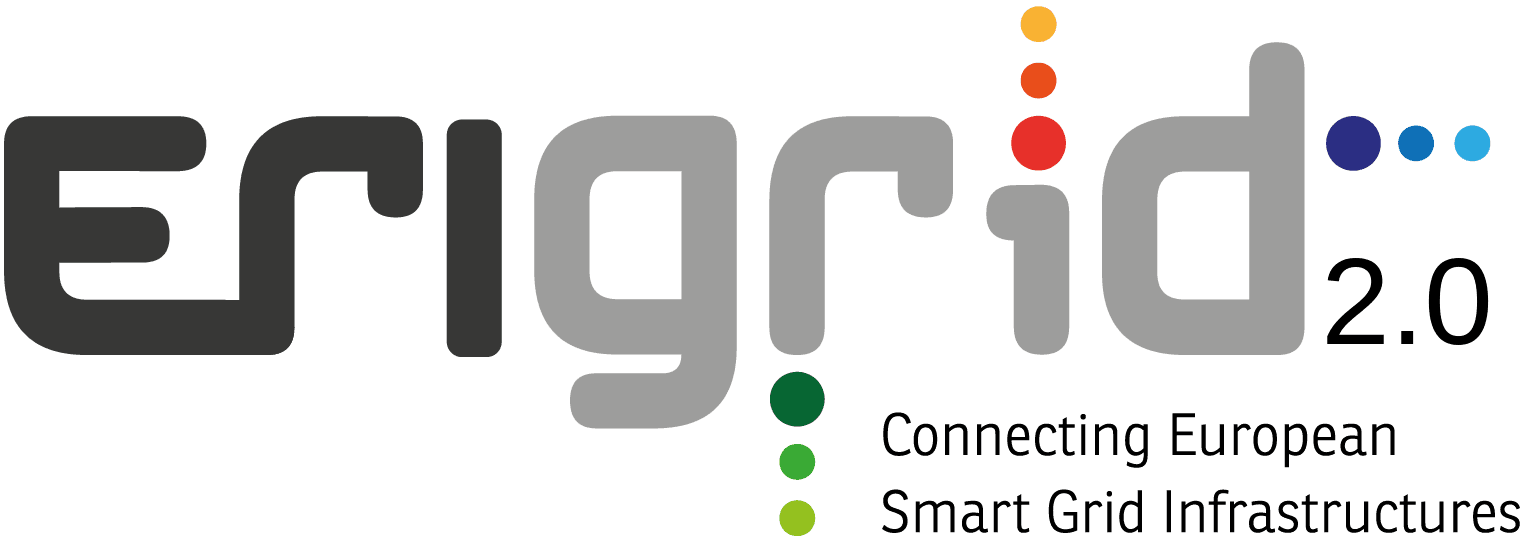
The Institute of Communication and Computer Systems (ICCS) is linked to the National Technical University of Athens (NTUA) and is the research host of the School of Electrical and Computer Engineering (ECE). It was founded in 1992, with the ‘charta’ to support the performance of top-quality research, development activities and the provision of scientific service to private and public bodies in themes mainly include Computer Network Technology, Communication Technologies, Control and Automation Technologies, Energy and Power Production Technologies, Information Systems and Management Decision Technologies, Biomedical and Biomechanics Technologies.
Among the research groups of ICCS is the Electric Energy Systems Laboratory (EESL), which offers experimental training for students, and Smart RUE, which focuses on research and technological developments in the area of Smart Grids.
Location: Athens, Greece
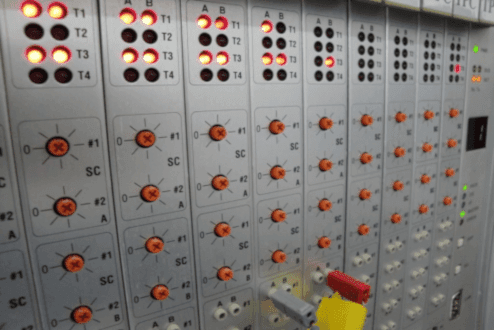
The EESL (ELECTRIC ENERGY SYSTEMS LABORATORY) comprises the following equipment:
- Low Voltage Microgrid: A main component of the laboratory is the single phase microgrid that includes a PV generator, a small Wind Turbine, battery energy storage, controllable loads and a controlled interconnection to the local LV grid. The battery unit, the PV generator and the Wind Turbine are connected to the AC grid via fast-acting DC/AC power converters. The converters are suitably controlled to permit the operation of the system either interconnected to the LV network (grid-tied), or in stand-alone (island) mode, with a seamless transfer from the one mode to the other. Part of the laboratory’s infrastructure is the 3- phase microgrid with main elements 3 single-phase battery inverters and micro-sources connected in each phase.
- Multi-Microgrids Cluster: The three ICCS-NTUA Microgrids form a Multi-Microgrid cluster (through Electrical and Internet connection) in order to investigate the development and verification of different control strategies and the impact of wide deployment of Microgrids at the distribution level.
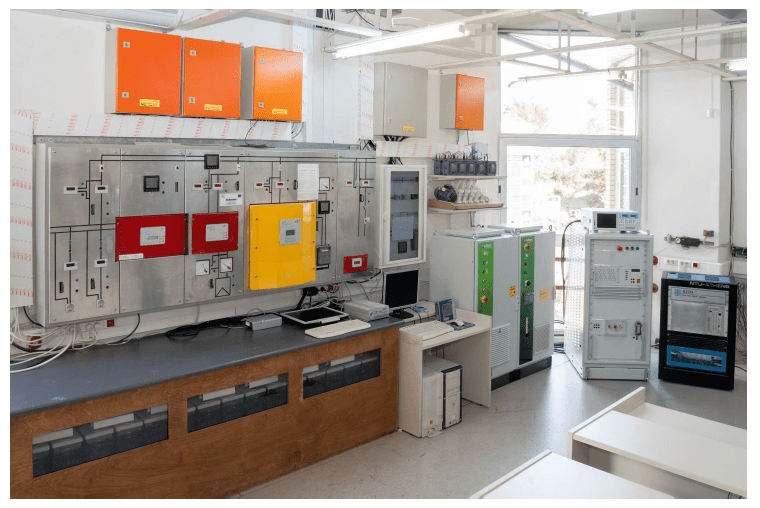
- Multi-Agent System for Microgrid Operation: Multi-agent technology has been implemented for the control of the distributed sources and the loads of the LV microgrid. The system is developed in the Java based platform called Jade and communicates with the DER/DGs via industrial communication protocols such as OPC. Furthermore the laboratory is equipped with 10 load controllers. These are embedded systems with Java Virtual Machine, multiple analogue & digital I/O as well TCP/IP connectivity. This system can be used to test in the laboratory or in a real test field various algorithms for distributed control of Microgrids and DG/RES. Some of the functionalities that can be tested are: market participation of the Loads or the DG/RES, formulation of a VPP, ancillary services provision, black start operation, islanded operation, multi-Microgrid operation and emergency load shedding. Moreover, Multi-Agent Systems can control real-time simulated devices in RTDS and hardware components, combining Hardware in the Loop simulation with a Multi-Agent-System architecture to allow more realistic testing.
- Laboratory SCADA: The laboratory SCADA is implemented using a PLC (Programmable Logic Controller) system with LabVIEW/CoDeSys software. It provides measurements on the AC and DC side of the inverters, environmental measurements (irradiation, wind speed etc.), control of the DGs and load profile programming.
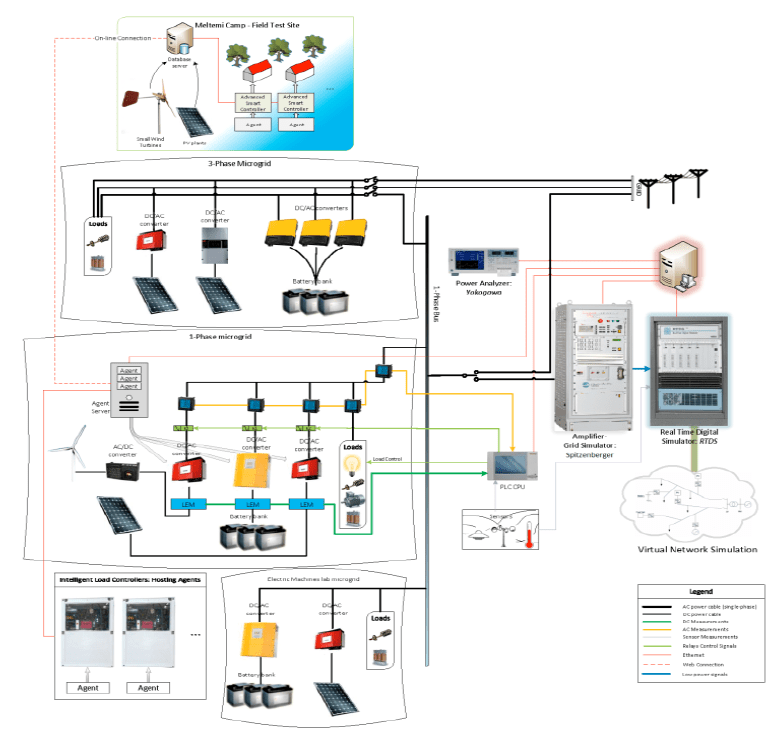
- Power Hardware-in-the-Loop (PHIL) simulation environment: The PHIL facility developed at ICCS-NTUA provides an efficient environment for studying interactions between hardware DER power devices and various simulated networks. A rack of the commercially available Real Time Digital Simulator RTDS® is operated. A Switched-Mode Amplifier by Triphase and a linear amplifier by Spitzenberger & Spies (PAS 5000) are used as a Power Interfaces between the RTDS and physical equipment to perform PHIL simulation. The Triphase power electronic converter platform allows the user to design in Matlab/Simulink the control algorithms. PHIL experiments are performed, where hardware equipment (loads, PV inverters, etc) are connected to simulated distribution networks. An irradiation sensor and an anemometer, provide input to simulated models in the RTDS in order to achieve realistic conditions.
- Controller Hardware in the Loop (CHIL) simulation environment: In the context of its involvement with microgrids and dispersed generation, the research group is active in the development and study of advanced control algorithms for power electronic converters (DC/DC, DC/AC, AC/DC/AC, etc.). Based on the real-time simulator (RTDS) and a controller provided by Triphase, it is possible to thoroughly test control algorithms of power converters in an environment that reveals “hidden” weaknesses and faults in the design of these algorithms. Specifically, the design of the control algorithm is performed in the controller of Triphase while the power electronics are simulated in the RTDS. The communication between the two systems is achieved through analog and digital signals.
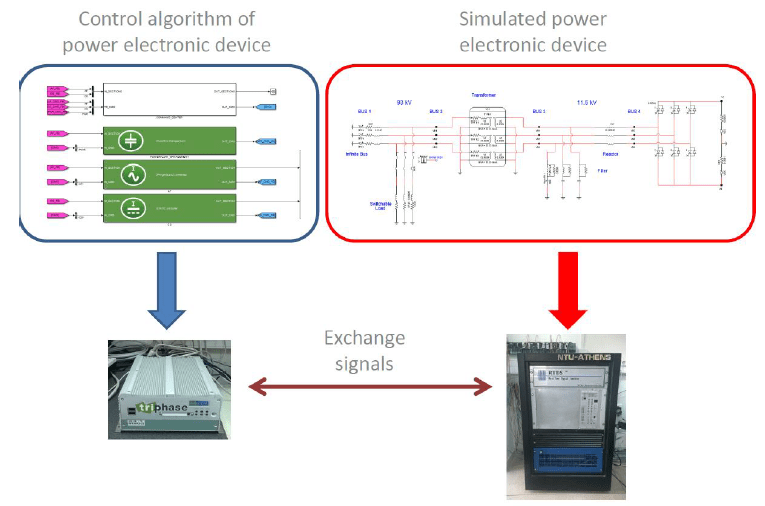
- Combined CHIL and PHIL testing of smart grid controllers: The combination of CHIL and PHIL simulation is applied for testing smart grid controllers (e.g. coordinated voltage controller). The setup allows testing a controller in a CHIL configuration, while critical power components are incorporated as physical devices (PHIL) allowing more realistic conditions.
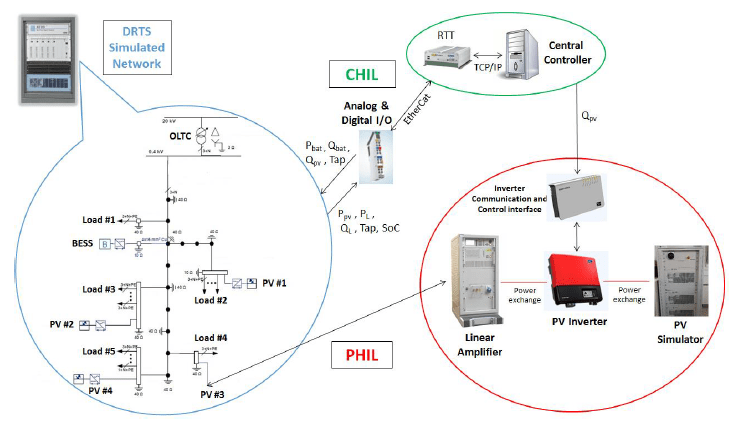
- Adaptive Protection System in Distribution Grids with DER Penetration in a HIL environment: In order to study new protection problems arising, a laboratory adaptive protection system has been developed at ICCS-NTUA. The electrical networks are designed and studied in the real-time digital simulator (RTDS). Through analogue and digital signals the RTDS is connected to external devices, such as the industrial protection relay SEL-311B. The relay is programmed to protect a feeder of the electrical network and receive voltage and current signals from the RTDS. It also controls the status of the simulated breaker in the RTDS while its condition is fed back to the relay. All relays have overcurrent elements with 2-6 setting groups that are used for the adaptive protection implementation.
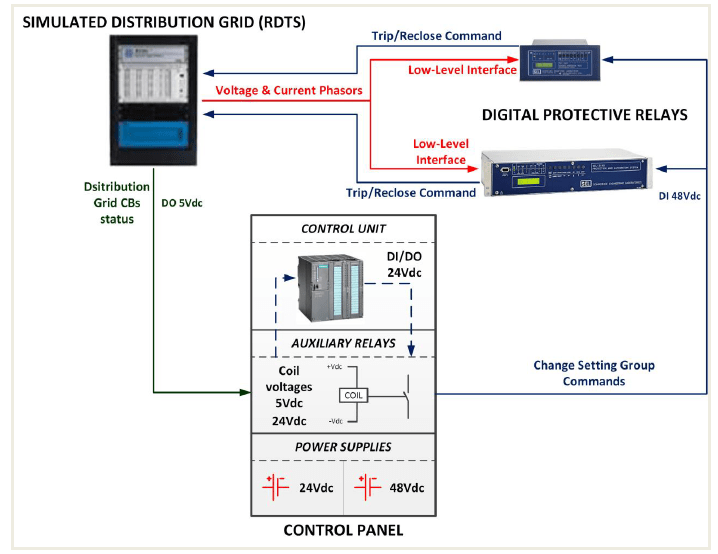
- PV Inverter testing according to standards: The laboratory operates the necessary equipment to perform tests on photovoltaic inverters according to standards. A PV Simulator by Regatron (3x TopCon Quadro Programmable DC Power Supply) features fully controllable and customizable voltage-current characteristics (V-I), and a Linear Amplifier/Grid Simulator by Spitzenberger & Spies (PAS 5000 – 4 Quadrant Linear Amplifier 5kVA) applies voltage (dips, introduction of harmonics etc) and frequency variations on the inverter. In this way a testing environment is created for the testing of both the direct current (DC) and alternating current (AC) side of the inverter. By appropriately controlling the two simulators, the necessary conditions specified by the standards for PV inverter tests are represented. The tests that can be carried out in the laboratory are:
- Static and Dynamic Maximum Power Point Tracking (MPPT) (EN 50530)
- EMC tests (IEC 61000-3-2, Harmonic measurements 0-100KHz, etc.)
- Connection requirements (VDE-AR-N 4105)
- Fault ride through (VDE 0126-1-1)
- Anti-islanding Requirements (In progress)
The electrical quantities (voltage, current, power, etc.) during the tests can be measured accurately and analyzed with the use of a Yokogawa WT3000 Power Analyzer.
- Flexible Power Electronics Configuration for Coupling RES & Storage: At EESL the simulation of distribution network under future scenarios is thoroughly analysed. An integral part of this process are the Triphase’s Distributed Power Modules that realize a scalable, flexible and open platform for rapid prototyping of power conversion and power system applications. The setup consists of a 15 kVA bidirectional active frontend (DC/AC), and a 15 kW bidirectional DC/DC converter consisting of 3 channels. The Power Modules are fully reconfigurable and open. Researchers have access to all data and can change all the software (based on Matlab/Simulink) from the highest level (e.g. coordination and control of power flows between the storage and the grid) down to the lowest level (e.g. PWM control). Currently the module is operated as a 3ph inverter to interface a battery storage system or as a 1ph-3-leg back to back converter (AC/DC/AC) for power amplification. All converters are connected to a single DC bus which is accessible to external DC sources (e.g. Dc simulator). The open, reconfigurable and fully reprogrammable structure of the Power Modules can readily be adapted to new research areas.
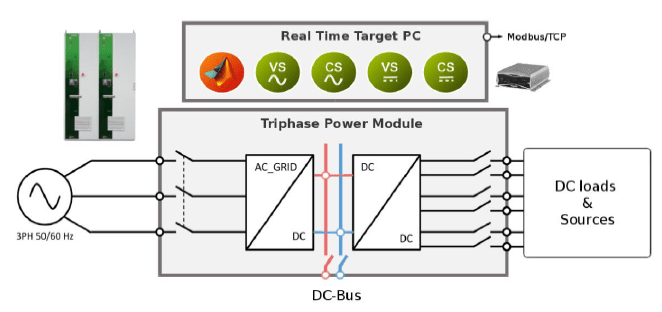
- Axial flux generator bench testing facilities: The bench testing rig allows for the testing of axial flux generators of power up to 9kW and maximum diameter of up to 1m. With the use of a 60 HP DC motor, a DC bi-directional drive and a tachogenerator, the axial flux generators can be driven at different and constant revolutions per minute (RPM). Different loads can be applied to the generators such as a grid-tie inverter for grid connection or a 12/24/48V battery bank for battery charging modes, along with a diversion load controller and resistive load. In addition, a three phase ohmic load of maximum power 3.3kW can be connected directly to the generator. The experimental setup mentioned allows for a complete analysis of the generator’s behavior under different situations.
- Residential Wind and Hydro Turbines construction: The study and simulation of residential wind and hydro turbines for rural electrification applications follows local manufacturing which enables the user with the ability of local maintenance and immediate repairs of possible failures. In the workshop, small wind and hydro turbines are constructed from scratch. Up until now, residential wind turbines for battery charging and grid connection have been manufactured, with rotor diameters of up to 4.3 meters and a pico-hydro system of 500W.
- Micro-CHP unit (combined generation of heat and power): 6 kW electrical and 14.9 kW thermal output at nominal load and an overall efficiency of 94%. The unit is based on a 3 cylinder internal combustion engine and a 3-phase synchronous generator. It provides its electrical generation to local electrical loads, while the thermal output is used to heat water. Moreover, the unit offers remote control and monitoring capabilities.
- Meltemi Test Site: ICCS-NTUA has access to the Meltemi site where a number of Distributed Generators (DGs) are installed, including a 40kVA diesel generator, 4.5 kW photovoltaic panels and small residential wind turbines that can partially support the Meltemi camping load in islanded Microgrid operation. The MAGIC (Multi-Agent Intelligent Control) system installed in a number of households allows the DGs and the loads to negotiate in order to decide next sequence of actions. This system is a Java based software that implements intelligent agents. The test site also allows for outdoor measurements of the power and energy production of household small wind turbines for grid connected and battery charging applications. The facilities of the test site are in accordance to the IEC international standard IEC 61400-12-1. With the use of the standard one can plot the power curve, the system’s power coefficient Cp and also predict the annual energy production of the turbine for different mean wind speeds. More information
- E mobility lab facilities: The lab facilities which can be exploited for e-mobility applications are:
- An EV (Electric Vehicle) emulator supporting the interoperability testing of the EV related protocols (IEC61851) is developed. It can be connected to an EVSE (Electric Vehicle Supply Equipment), as the device under testing, in order to validate its compliance with the standards.
- An EVSE emulator allowing the charging of a real or emulated EV in respect to IEC61851. The EVSE can also communicate with external stakeholders, i.e. the EVSEO, implementing the OCPP 1.5 protocol. Apart from the EVSE emulator, a commercial EV charging station (ETREL wallbox- 32A) is also available with smart charging capabilities.
- An EVSEO (Electric Vehicle Supply Equipment Operator) adopting the OCPP 1.5 protocol for the communication with custom-made or commercial EVSE.
- A custom-made energy management system with user interface offering several services to e-mobility stakeholders such as searching for EVSE location, electricity price information, EVSE availability, booking capabilities. The interaction between the EV user interface and the EVSEO is realized via Rest-Based Web Service technology.
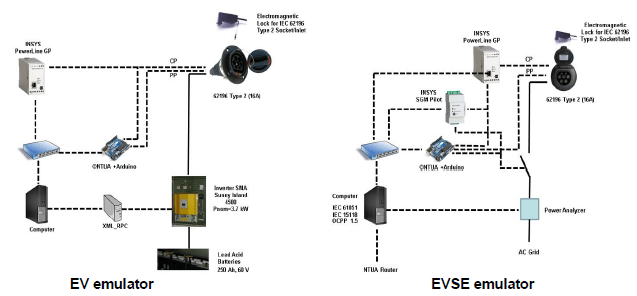
Relevant Publications
– P. Kotsampopoulos, V. Kleftakis, N. Hatziargyriou, “Laboratory Education of Modern Power Systems using PHIL Simulation”, IEEE Transactions on Power Systems, Vol. 32, Issue: 5, Sep-tember 2017. Read More…
– M. Maniatopoulos, D. Lagos, P. Kotsampopoulos, N. Hatziargyriou, “Combined Control and Power Hardware-in-the-Loop simulation for testing Smart grid control algorithms”, IET Gen-eration, Transmission & Distribution, Vol. 11, Issue 12, August 2017. Read More…
– V. A. Papaspiliotopoulos, G, N. Korres, V. A. Kleftakis, N. D. Hatziargyriou, “Hardware-In-the-Loop Design and Optimal Setting of Adaptive Protection Schemes for Distribution Systems With Distributed Generation”, IEEE Transactions on Power Delivery, Vol: 32, Issue: 1, February 2017. Read More…
– G. Messinis, V. Kleftakis, I. Kouveliotis-Lysikatos, A. Rigas, A. Vassilakis, P. Kotsampopoulos, N. Hatziargyriou, “A Multi-Microgrid Laboratory Infrastructure for Smart Grid Applications”, 9th Mediterranean Conference on Power Generation, Transmission Distribution and Energy Conver-sion (MedPower), Athens, November 2014
The main services offered by the above facilities are:
- Performance of Power Hardware-in-Loop testing of DER devices integrated with the RTDS simulator. MIMO PHIL tests can also be performed using the two power amplifiers of the lab.
- CHIL applications with the RTDS simulator and an external Triphase Target PC which allows the design of the control algorithm in Matlab/Simulink and it’s testing in real time.
- Rapid prototyping of power electronic converters (Triphase converters)
- Distributed control (Multi Agent System) testing and performance of optimizations using HIL simulations
- Fast testing of developed control algorithms (Matlab/Simulink) in flexible hardware power electronic converters (DC/DC, DC/AC, AC/DC/AC) provided by Triphase
- Power curve measurement of Small Wind Turbines
- Testing and validation of DG components within the Microgrids operation
- Testing commercial or custom made e-mobility products for their compliance with EV standards/protocols (IEC61581, OCPP)
- Developing and testing EV smart management algorithms in lab environment (microgrids)
- Testing and validating EV integration within simulated distribution network in the RTDS
- PV inverter testing according to standards (MPPT, LVRT, etc.)
- Testing of protection schemes with the RTDS
- Steady state and dynamic simulations of power systems with high RES penetration: using various in-house and commercial packages.
- Operation of Micro CHP Unit
The Institute of Communication and Computer Systems (ICCS) is a private law body associated with the Department of Electrical and Computer Engineering of the National Technical University of Athens (NTUA). ICCS has been established in 1989 by the Ministry of Education in order to carry research and development activities in the fields of telecommunication systems and computer systems and their applications in a variety of applications, such as electric power systems, software and hardware engineering, control systems and biomedical engineering. R&D staff of ICCS-NTUA consists of 40 members of staff of NTUA, 20 additional senior researchers and 120 research students.
Smart RUE is one of the Research Groups of ICCS. It belongs to the Electric Energy Systems Laboratory (EESL) of the School of Electrical and Computer Engineering of the National Technical University of Athens. It was founded by Professor Nikos Hatziargyriou and operates under his supervision. It is composed of Professors, post-doctoral scientists, postgraduate students and highly specialized researchers and collaborators. It is technically and administratively supported by the personnel of EESL.
The main activities of Smart RUE focus in research and technology development in the area of Smart Grids. The main Smart RUE activities deal with planning and operation of modern power systems characterized by high penetration of renewable energy sources, distributed generation and flexible loads. For the efficient solution of related problems advanced control and ICT technologies are employed.
Smart RUE has coordinated and participated in a large number of European and national R&D projects and studies. It has organized several international Conferences, Seminars and workshops and it has published numerous papers in international journals and conference proceedings. Its members are active in several EU and international organizations. It maintains excellent connections with many Universities, Research Centers, Utilities and Power Industries active in the area of Smart Grids both at national and international level.
For safety reasons, for critical applications, the users are not expected to operate the systems by themselves; even when safety instructions will be provided, tests will be carried out by staff of ICCS-NTUA. For the rest of applications and after ad-hoc training, the user group will have full access to the related facilities for the duration of the stay (with the support of ICCS-NTUA’s researchers and laboratory technicians when necessary). Remote lab access might be possible but needs to be discussed with the hosting organization. The scheduling of the experiments will be agreed and booked prior to the stay according to the availability of the involved staff and equipment. Administrative documentation for the access (contract, non-disclosure agreement, etc.) will comply with ERIGrid 2.0 common indications. In addition to the general corporate services (Internet connection, canteen, etc.) and the support and advice on accommodation and transportation to ICCS-NTUA infrastructure, the access being offered includes supervision and help of ICCS-NTUA staff:
- As a complement to the pre-access contacts between the user group and ICCS-NTUA, the stay will start with an introductory meeting with a senior researcher for confirming the stay conditions (confidentiality, safety indications), scheduling the activities, explaining the on-site procedures, clarifying the logistics and technical details.
- Preparatory work: a laboratory technician will assist the users for the installation of the devices, electrical connections, use of the specific instrumentation, preparation of a test procedure (if necessary) on the basis of the users requests, and programming of the experimental conditions.
- ICCS-NTUA’s researchers will support the realization and follow-up of the experiments.
- ICCS-NTUA’s researchers will support the results interpretation, data processing and analysis, and test report preparation.
Reimbursement of expenses
User expenses for the lab access are paid by ERIGrid 2.0 (EU H2020 Programme). This includes travels to Athens by plane, accommodation, daily subsistence, and daily transportation during the stay. For the user projects taking place in ICCS-NTUA, ICCS-NTUA will refund the stay expenses when the stay is finished: the user must declare the incurred expenses and present the invoices/receipts to ICCS-NTUA in order to get the refund. Reasonable expenses must be made by the user: travels will be made in economy class and conventional hotels (not luxury) or equivalent accommodation will be used. As an indication (it is not a daily allowance), a maximum subsistence fee of 60 €/person must be considered per day, excluding the hotel cost (i.e. for meals, coffee etc). The tickets for the transportation to and from NTUA (metro, bus) will be also reimbursed.
Do you have questions left? Feel free to contact us below.
If your enquiry contains strictly confidential information, please leave your contact details below and the lab host will contact you personally.




